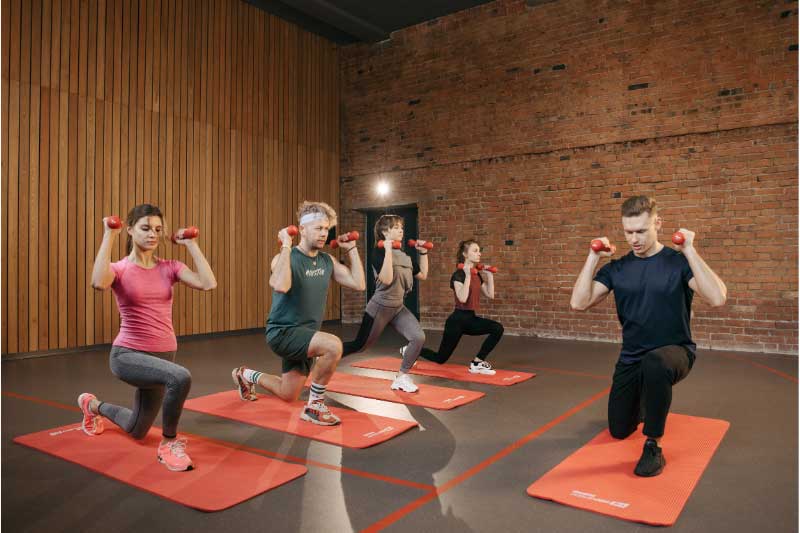In today’s fast-paced world, staying fit has become more than just a trend; it’s a lifestyle choice that impacts every aspect of our lives. Whether you’re an athlete, a busy professional, or someone just trying to lead a healthier life, understanding the fundamentals of fitness is key to making informed decisions about your health. This blog post will guide you through the intricacies of fitness, offering practical tips, insights, and examples to help you get started. From defining what fitness truly means to explore different exercise and nutrition types, we’ve got you covered.
The Meaning of Fitness
Fitness is often misunderstood as simply looking good or performing physical tasks with ease. However, it encompasses much more than that. At its core, fitness refers to a state of health and well-being where an individual can perform daily activities with vigor without undue fatigue. It involves various components, including cardiovascular endurance, muscular strength, flexibility, and body composition.
Understanding fitness is crucial for anyone looking to improve their health. Fitness influences our physical capabilities and impacts our mental well-being. By focusing on fitness holistically, you can enjoy a balanced and fulfilling life. It’s about making sustainable choices that benefit both your body and mind.
Achieving fitness is a personal journey that varies from one individual to another. Factors such as age, gender, lifestyle, and personal goals all play a role in determining what fitness means for you. Recognizing this diversity is essential to creating a fitness plan that enhances your life.
Types of Physical Activity
Physical activity comes in many forms and serves different purposes. Understanding the various types is crucial for crafting a well-rounded fitness regimen. The three main types of physical activities are aerobic, strength, and flexibility exercises. Each plays a unique role in improving your overall fitness.
Aerobic exercises, also known as cardiovascular exercises, include activities like running, swimming, and cycling. These exercises increase your heart rate and improve cardiovascular endurance, helping your heart and lungs function efficiently. They are essential for boosting metabolism, reducing stress, and promoting weight loss.
Strength exercises focus on increasing muscle mass and improving muscular strength. Activities such as weightlifting, resistance training, and bodyweight exercises fall under this category. Strength training enhances bone density, increases metabolism, and helps in maintaining a healthy weight by building lean muscle mass.
Flexibility exercises, including yoga and stretching, enhance the range of motion in your joints and muscles. These exercises prevent injuries, improve posture, and promote relaxation. Incorporating flexibility training into your routine ensures a comprehensive approach to fitness.
The Importance of Setting Goals
Setting goals is a vital step in any fitness journey. Goals provide direction and motivation, helping you stay committed and focused. They give purpose to your efforts and make the process more enjoyable and rewarding. You can track your progress effectively by setting specific, measurable, achievable, relevant, and time-bound (SMART) goals.
Having clear goals allows you to tailor your fitness plan to suit your needs. Whether you aim to lose weight, gain muscle, or improve stamina, setting goals helps you prioritize your activities and allocate time effectively. It provides a roadmap that guides you through the ups and downs of your fitness journey.
Regularly reviewing and adjusting your goals is essential for sustained success. As you achieve milestones, set new challenges to keep yourself engaged and motivated. Celebrating your achievements, no matter how small, boosts confidence and encourages consistency.
Nutrition and Fitness Connection
Nutrition plays an integral role in fitness. What you eat fuels your body and directly affects your performance and recovery. A balanced diet provides the necessary nutrients for energy, muscle repair, and overall well-being. Understanding the relationship between nutrition and fitness is essential for achieving your health goals.
Macronutrients—carbohydrates, proteins, and fats—are the building blocks of a healthy diet. Carbohydrates provide energy for workouts, proteins support muscle growth and repair, and fats offer long-lasting energy and aid in nutrient absorption. Balancing these macronutrients ensures optimal performance.
In addition to macronutrients, micronutrients such as vitamins and minerals are vital for maintaining bodily functions and preventing deficiencies. They support various processes, including immune function, bone health, and energy production. A well-rounded diet rich in fruits, vegetables, lean proteins, and whole grains provides essential micronutrients.
Staying Motivated on Your Fitness Journey
Motivation is a key factor in maintaining a successful fitness routine. It drives you to push through challenges, stay consistent, and ultimately achieve your goals. Understanding what motivates you and finding ways to sustain that motivation is crucial for long-term success.
Intrinsic motivation, which comes from within, is a powerful force. It involves finding joy and satisfaction in the process itself rather than relying solely on external rewards. Focusing on how exercise makes you feel, the sense of accomplishment, and the positive effects on your mental health can help maintain intrinsic motivation.
Creating a supportive environment is also vital. Surround yourself with like-minded individuals who share your fitness goals. Whether it’s joining a fitness class, hiring a personal trainer, or participating in online communities, social support enhances accountability and makes the experience more enjoyable.
Overcoming Common Fitness Challenges
Every fitness journey has obstacles. Identifying and overcoming these challenges is essential for progress. Common barriers include lack of time, motivation, injuries, and plateaus. Addressing these issues head-on can help you stay on track.
Time management is crucial for fitting fitness into a busy schedule. Prioritize exercise by scheduling it like any other important appointment. Finding activities you enjoy, such as dancing or hiking, can make exercise feel less like a chore and more like a leisure activity.
Injuries are a common setback in fitness. Preventing injuries involves proper warm-ups, using the correct form, and listening to your body. If you experience an injury, consult a healthcare professional and allow time for recovery. Once you’re healed, gradually ease back into your routine.
Integrating Fitness into Daily Life
Making fitness a part of your daily routine ensures long-term success. Consistency is key, and finding ways to incorporate physical activity into your lifestyle makes it more sustainable. Simple changes, such as taking the stairs instead of the elevator or walking during lunch breaks, can significantly impact your fitness level.
Creating a balanced schedule that includes regular exercise, adequate rest, and proper nutrition is essential. Remember, it’s not about perfection but progress. Small, consistent efforts yield significant results over time. Choose activities that fit your lifestyle and preferences to make fitness enjoyable and achievable.
Adaptability is crucial for maintaining a fitness routine amidst life’s demands. Be open to adjusting your plan when necessary. Whether due to a busy workweek or travel commitments, finding creative ways to stay active, like online workouts or hotel gym sessions, ensures you remain committed to your goals.
The Role of Technology in Fitness
In today’s digital age, technology is a valuable tool for enhancing fitness. From fitness apps to wearable devices, technology offers innovative ways to track progress, monitor health metrics, and stay motivated. Leveraging technology can optimize your fitness routine and provide valuable insights.
Fitness apps offer a wide range of features, including workout plans, tracking capabilities, and personalized coaching. They can help structure your workouts, set goals, and monitor progress. Many apps also provide access to guided workouts, making it easier to stay consistent and motivated.
Wearable devices, such as fitness trackers and smartwatches, provide real-time data on activity levels, heart rate, and sleep patterns. These devices offer a comprehensive view of your fitness and overall health. Analyzing this data enables you to make informed decisions and adjust your routine accordingly.
Exploring Diverse Fitness Activities
Engaging in a variety of fitness activities keeps your routine exciting and prevents burnout. Exploring different forms of exercise challenges your body in new ways and promotes overall fitness. Whether it’s trying a new sport, dance class, or outdoor adventure, diversity enhances your fitness experience.
Cross-training, which involves participating in multiple types of exercises, offers numerous benefits. It reduces the risk of injury by avoiding overuse of specific muscles, enhances overall performance, and prevents monotony. Incorporating elements of cardio, strength, and flexibility training ensures a balanced approach.
Experimenting with activities you enjoy fosters a positive attitude toward fitness. It allows you to discover new passions and interests while staying physically active. Remember, fitness should be enjoyable, and finding activities that align with your personality and goals makes the process sustainable.
The Benefits of Rest and Recovery
Rest and recovery are integral components of a successful fitness routine. Giving your body time to rest allows muscles to repair and grow stronger. Adequate recovery prevents burnout, reduces the risk of injury, and enhances overall performance. Prioritizing rest is essential for long-term success.
Active recovery, which involves low-intensity activities such as walking or gentle yoga, promotes circulation and reduces muscle soreness. It allows you to stay active while giving your body a break from intense workouts. Incorporating rest days into your schedule ensures a balanced approach.
Sleep is crucial to recovery. Quality sleep supports muscle repair, hormone regulation, and mental well-being. To optimize recovery and overall health, aim for 7-9 hours of uninterrupted sleep each night. Creating a relaxing bedtime routine and minimizing screen time before sleep enhances sleep quality.
Tracking Progress and Celebrating Achievements
Monitoring your progress and celebrating achievements are essential for maintaining motivation and staying on track. Tracking allows you to assess what works, identify areas for improvement, and make necessary adjustments. It provides tangible evidence of your hard work and dedication.
Keeping a fitness journal or using a tracking app helps you record workouts, set goals, and track milestones. Regularly reviewing your progress enables you to identify patterns and make informed decisions about your fitness routine. Celebrate achievements, both big and small, to boost confidence and motivation.
Remember that progress is not always linear. Plateaus and setbacks are part of the journey. Instead of getting discouraged, use these moments as opportunities to reevaluate your approach and make necessary changes. Stay focused on your long-term goals and trust the process.
Conclusion
Fitness is more than just a physical pursuit; it’s a holistic lifestyle choice that impacts every aspect of your well-being. You can enjoy a healthier, more fulfilling life by understanding the fundamentals of fitness, setting clear goals, and making informed choices. Fitness is a personal journey, and there’s no one-size-fits-all approach. Explore, experiment, and find what works for you. Stay motivated, stay consistent, and most importantly, enjoy the process! Consider consulting with a fitness professional or joining a supportive community for further resources and personalized guidance. Your fitness journey is unique to you, and with the right mindset and tools, you’re well on your way to success.







